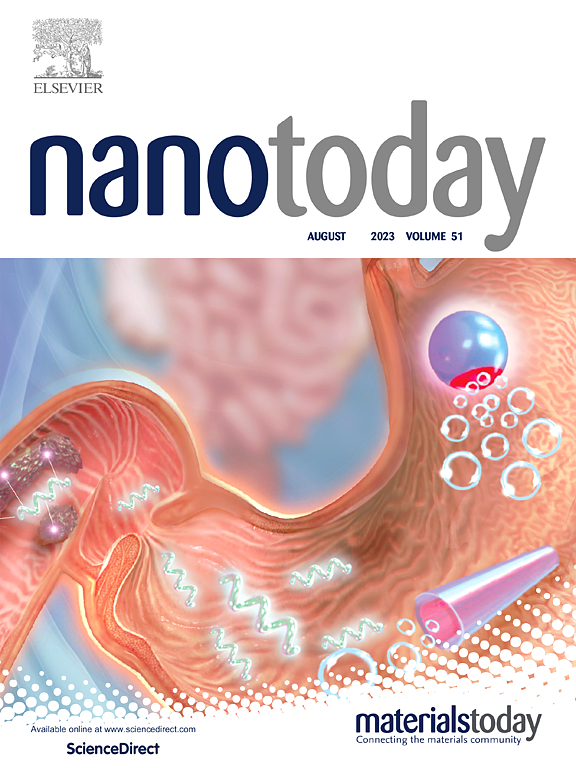自泵,ph响应Janus纤维敷料增强免疫调节和加速糖尿病伤口愈合
IF 13.2
1区 材料科学
Q1 CHEMISTRY, MULTIDISCIPLINARY
引用次数: 0
摘要
糖尿病性伤口,其特征是大量渗出物积累和炎症失调,由于其持续不愈合的性质,构成了全球医疗保健的挑战。传统疗法往往不能同时满足三个关键的愈合要求:精确的渗出液管理、协调的炎症免疫调节和促进再生的微环境建立。在这里,我们提出了一种创新的自泵Janus纤维敷料,将姜黄素负载的聚己内酯纳米纤维与棉纱结合在一起。它的梯度结构使自发渗出液引流和动态微环境调节,为加速伤口愈合建立了最佳环境。全面的体外研究证实了该药膏的多功能性,包括敏感的比色pH反应、抗菌性能(对金黄色葡萄球菌的抑制率>; 99% %)和抗氧化能力(>; 90% %的DPPH自由基清除能力)。在糖尿病小鼠模型中的体内研究表明,与商业棉敷料相比,该敷料具有优越的伤口愈合功效,伤口边缘浸渍减少~ 47% %,减轻炎症反应,促进血管生成。这种新颖的方法为开发适合慢性伤口管理和愈合的高级伤口敷料提供了有希望的基础。本文章由计算机程序翻译,如有差异,请以英文原文为准。
Self-pumping, pH-responsive Janus fibrous dressing for enhanced immunomodulation and accelerated diabetic wound healing
Diabetic wounds, characterized by excessive exudate accumulation and dysregulated inflammation, pose a global healthcare challenge due to their persistent non-healing nature. Traditional therapies often fail to simultaneously address three critical healing requirements: precise exudate management, coordinated inflammation-immune modulation, and pro-regenerative microenvironment establishment. Here, we present an innovative self-pumping Janus fibrous dressing integrating curcumin-loaded polycaprolactone nanofibers with cotton gauze. Its gradient architecture enables spontaneous exudate drainage and dynamic microenvironment modulation, establishing an optimal milieu for accelerated wound healing. Comprehensive in vitro investigations validate the dressing’s multifunctionality, including sensitive colorimetric pH response, antibacterial properties (>99 % inhibition against S. aureus), and antioxidant capabilities (>90 % DPPH radical scavenging). In vivo studies in a diabetic mice model demonstrate the dressing’s superior wound healing efficacy, with ∼47 % reduction in wound edge maceration, mitigated inflammatory responses, and enhanced angiogenesis compared to commercial cotton dressings. This novel approach provides a promising foundation for the development of advanced wound dressings tailored for the management and healing of chronic wounds.
求助全文
通过发布文献求助,成功后即可免费获取论文全文。
去求助
来源期刊

Nano Today
工程技术-材料科学:综合
CiteScore
21.50
自引率
3.40%
发文量
305
审稿时长
40 days
期刊介绍:
Nano Today is a journal dedicated to publishing influential and innovative work in the field of nanoscience and technology. It covers a wide range of subject areas including biomaterials, materials chemistry, materials science, chemistry, bioengineering, biochemistry, genetics and molecular biology, engineering, and nanotechnology. The journal considers articles that inform readers about the latest research, breakthroughs, and topical issues in these fields. It provides comprehensive coverage through a mixture of peer-reviewed articles, research news, and information on key developments. Nano Today is abstracted and indexed in Science Citation Index, Ei Compendex, Embase, Scopus, and INSPEC.
 求助内容:
求助内容: 应助结果提醒方式:
应助结果提醒方式:


